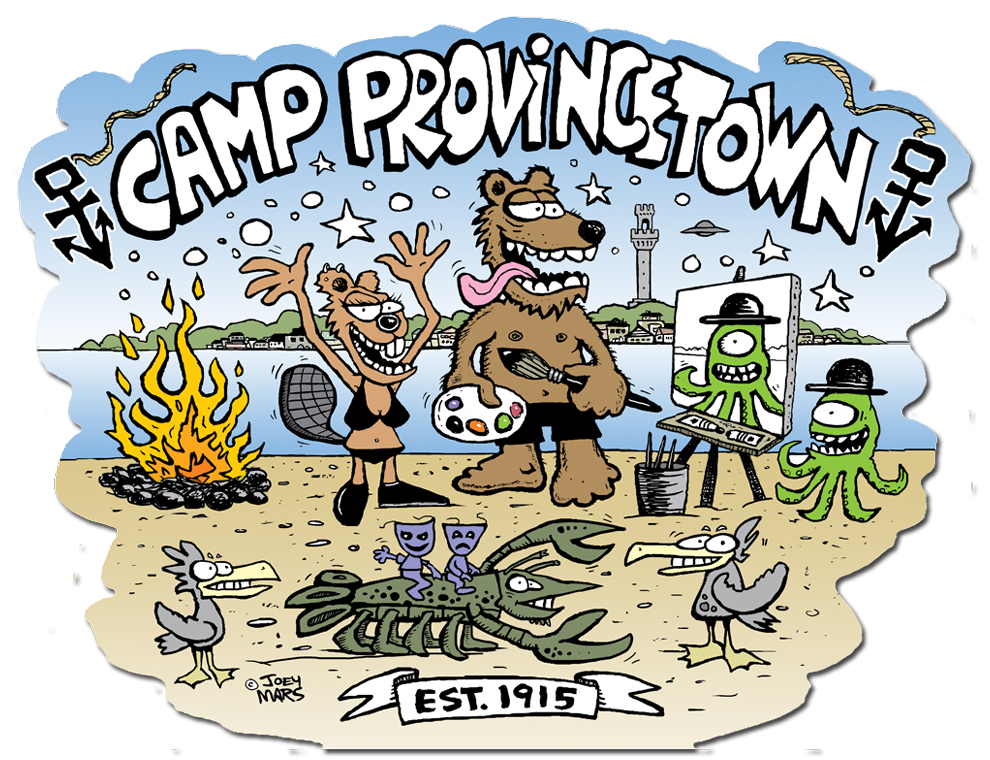
Camp Provincetown
The 2020 Diaries
When the going gets weird, the weird turn pro as the old Hunter S. Thompson adage goes. The virus spread, mutated, bobbed and weaved throughout most of 2020 which in turn changed our 400th Provincetown gallery season into a season of improvisational theatre. We abandoned the majority of the virtual world and rolled up our sleeves to take on the unknown the old fashioned way - where the tire meets the road. It was a gamble and it wasn't pretty but it paid off.
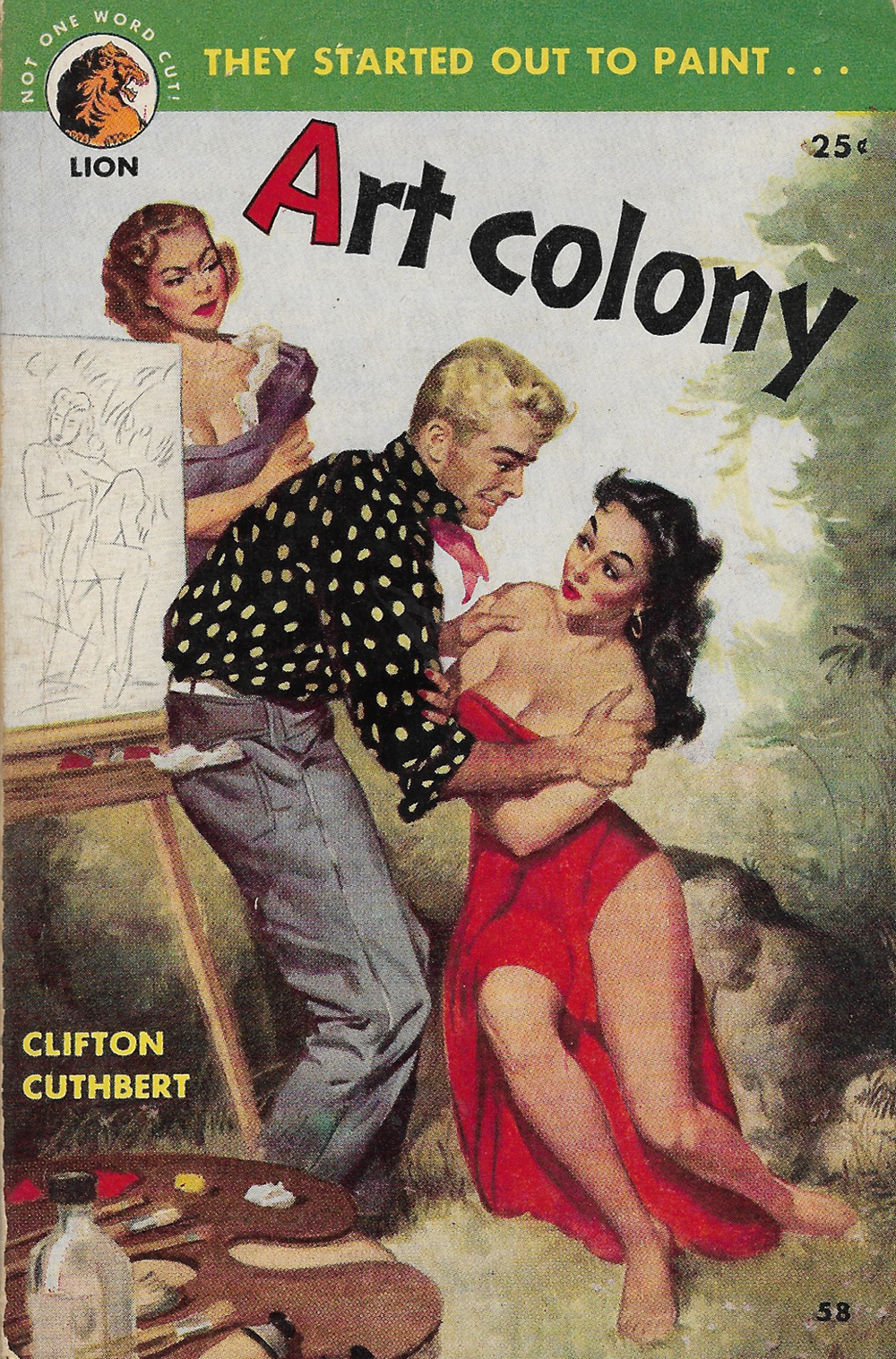
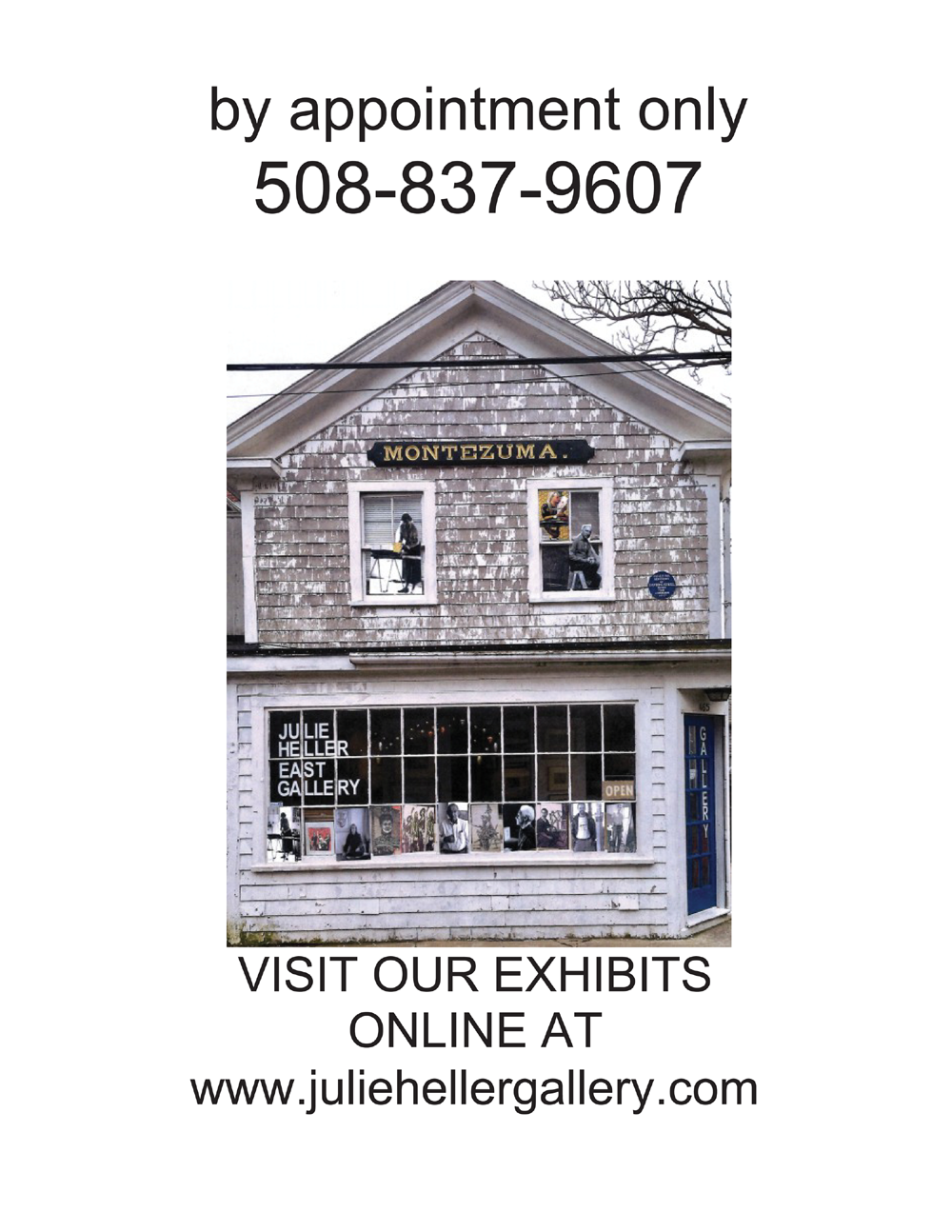
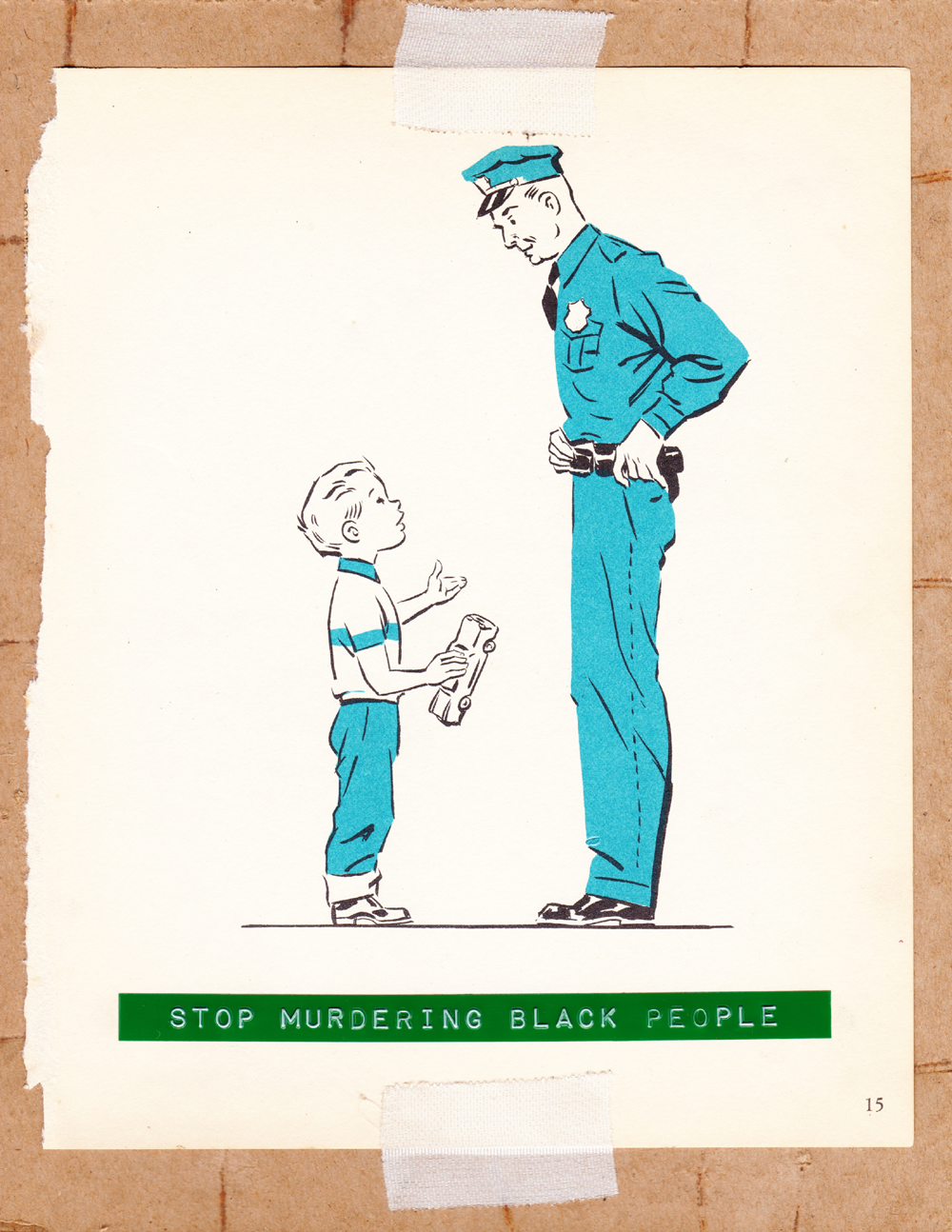

How Chuck White Organized Julie Heller’s Art Collection
Provincetown art history will come to life in a series of gallery showsBY JOHN GREINER-FERRIS for The Provincetown Independent
June 4, 2020
If ever there were a match made in heaven, it was six years ago, when Chuck White walked into Angel Foods in the East End of Provincetown and asked for directions to the Julie Heller Gallery, which just happened to be next door. Heller herself was browsing the aisles and was within earshot. She says that when she heard White, she popped up like a cartoon character, demanding in a faux cross voice, “Who wants to know?”
For a jack-of-all-trades such as White, it was a call to action. After a single semester at Emerson College, he had collected a patchwork of job titles that included musicologist, musician, historian, and multimedia specialist. He taught himself archival science by the seat of his pants with David Bieber, the former head of promotions at the legendary independent Boston rock radio station WBCN. White is now vice president and chief archivist of David Bieber Archives, a wall-to-wall repository of pop culture and memorabilia.
“I’m adventurous, and I’ve been thrown into all of these amazing situations,” White says. “When people got stuck and didn’t know what to do, they’d say, ‘Call Chuck.’ I was in A.P. classes and had the reputation of being smart.” Thanks to his friendship with Heller, he’ll be able to add art historian and curator to his C.V.
Together, using works from Heller’s overarching (and previously uncatalogued) collection of Provincetown artists, and unleashing White’s seemingly insatiable curiosity, archival skills, and limitless energy, the two have organized a season of exhibits they’re calling “A History of an American Art Colony,” tracing the legacy of Provincetown art. There will be a dozen exhibitions, starting June 12 through June 21, at Julie Heller East with works from Sun Gallery artists, and ending Nov. 13 through Nov. 24, at Julie Heller Gallery at Gosnold Street on the beach, with works by Helltown Gallery artists. The complete schedule, which has been amended as the coronavirus crisis unfolded, is on the gallery’s website, juliehellergallery.com.
When the town’s galleries are allowed to reopen, Heller’s will open to customers by appointment only. But since White had decided early to post the artwork, along with curatorial notes, on motherlode.tv (his own eclectic culture website), it can also be viewed online.
All this from a guy who, until recently, wasn’t that impressed with the Provincetown art world — he thought it was just for the tourists.
White grew up in Quincy. “The Neponset River was the line where everyone from Charlestown, Dorchester, and South Boston moved because of busing,” he says. “I didn’t understand the racism. The first person I fell in love with was Diana Ross. My first guitar hero was Jimi Hendrix.”
He began coming to Provincetown as a teen to help out in a friend’s T-shirt shop. Here, he saw the people he affectionately calls “misfits,” such as drag queens with razor blades under their tongues, kicking the asses of Hyannis football players who came to gay bash. “I thought, yeah, these are my people,” he says. “I didn’t fit in where I grew up, either.”
But he didn’t get the art. The visceral beat of punk, New Wave, and grunge music made more sense to him, and he gravitated to the music scene of Boston’s Kenmore Square. He wrote a 26-part series for the magazine Beat on the history of Boston rock. He played bass in the New Wave band Drezniak.
“I avoided art, because I knew music had everything to do with making you laugh or cry — it’s a personal relationship,” he says. “I always looked at the art world as something mysterious and intellectual.”
It took years for Provincetown art to land in his sights, and it was Peter Casperson, a music industry veteran who lives in Truro, who got him there. “Peter said, ‘P’town is 10 times more punk rock than you’ll ever be,’ ” White says. “I realized art is the same as music — it’s also a personal relationship.”
Google is tailor-made for an auto-didact such as White, whose natural response to a subject that piques his interest is intense investigation. Once his sights were locked in on the Provincetown art colony, White actually Googled “Provincetown artists, 1899,” then “Provincetown artists, 1900,” and so on, until 2020. Imagine the complex interconnection of people, incidents, and history he uncovered. It was just a matter of time before White and Heller, whose parents, Lester and Adele Heller, ran one of the iterations of the Provincetown Playhouse (a remnant of which is the Gosnold Street gallery), would cross paths. “Julie has been a mentor to me,” White says.
Heller earned a degree in American art history from George Washington University and opened her first gallery in 1980, which, she says, makes hers the oldest continuously running gallery in town. She says she has poured everything into her galleries and her collection. The summer exhibition White has organized goes right to the heart of what she loves.
“It covers such a span of time, and there’s something for everyone,” she says. “People ask me what’s my favorite period or artist, and I can’t say, because I love so much. I’m like a kid in a candy shop.”
“A History of an American Art Colony,” White says, arose out of what he found in Heller’s collection during the months he spent cataloging it, at a time when Heller was dealing with serious health issues. “The story emerges from the collection, not from me trying to jam it into some idea I had,” he says.
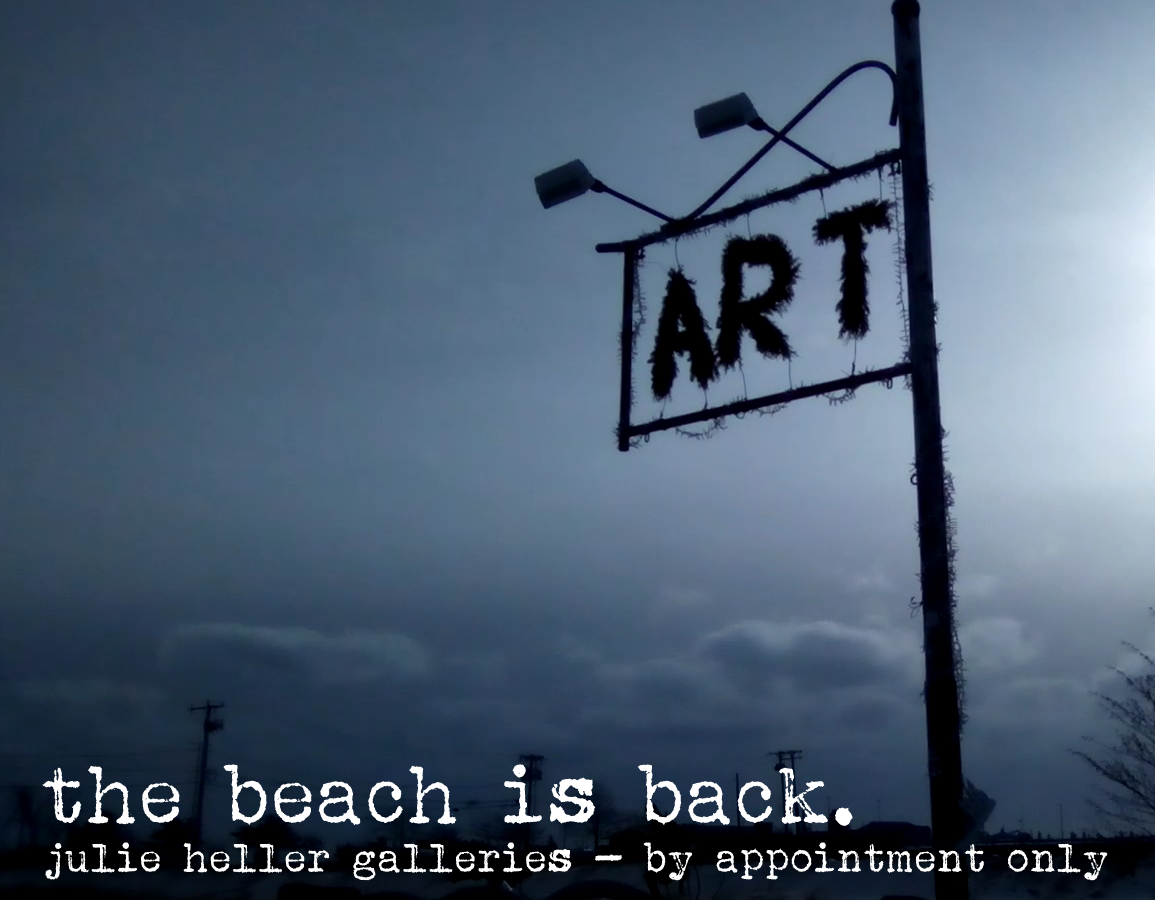
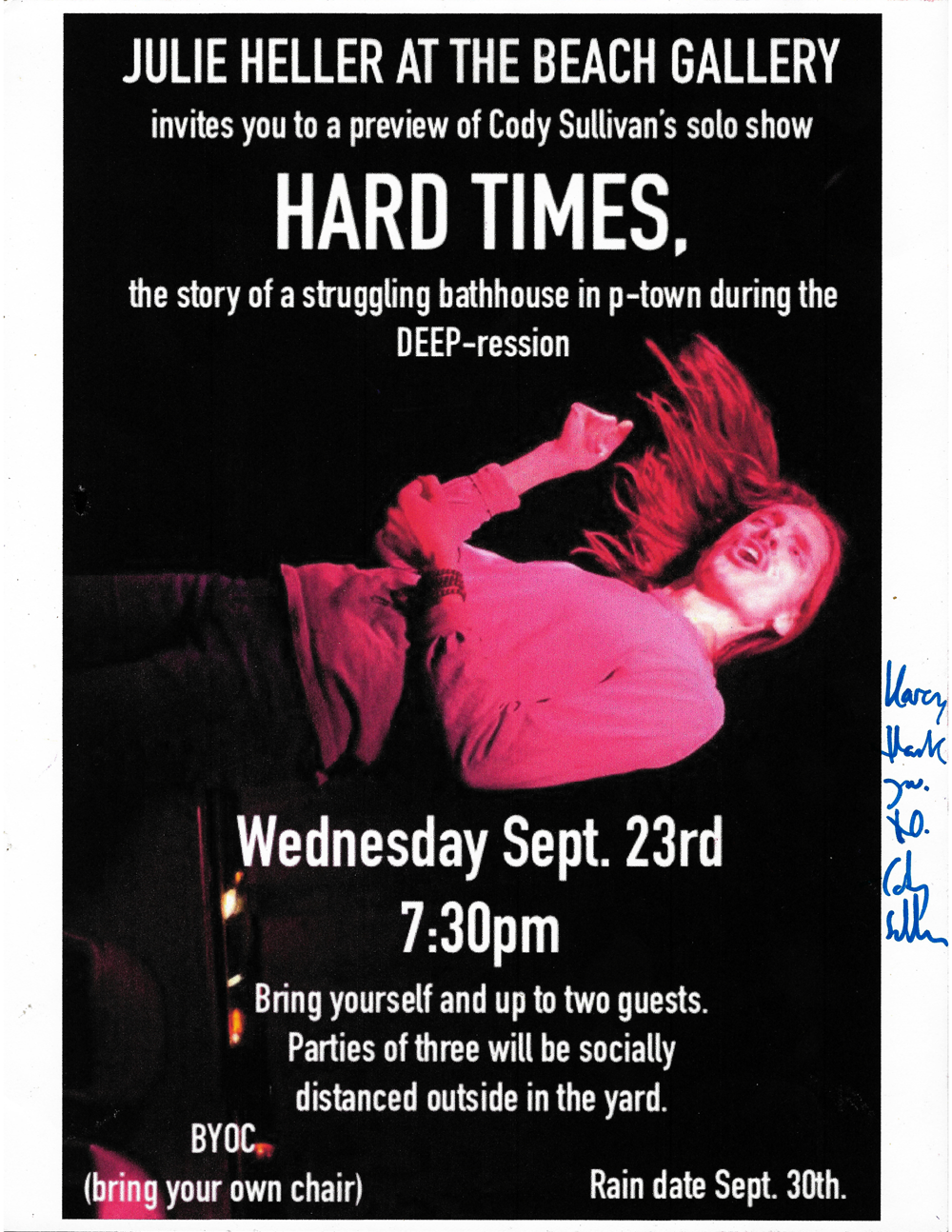
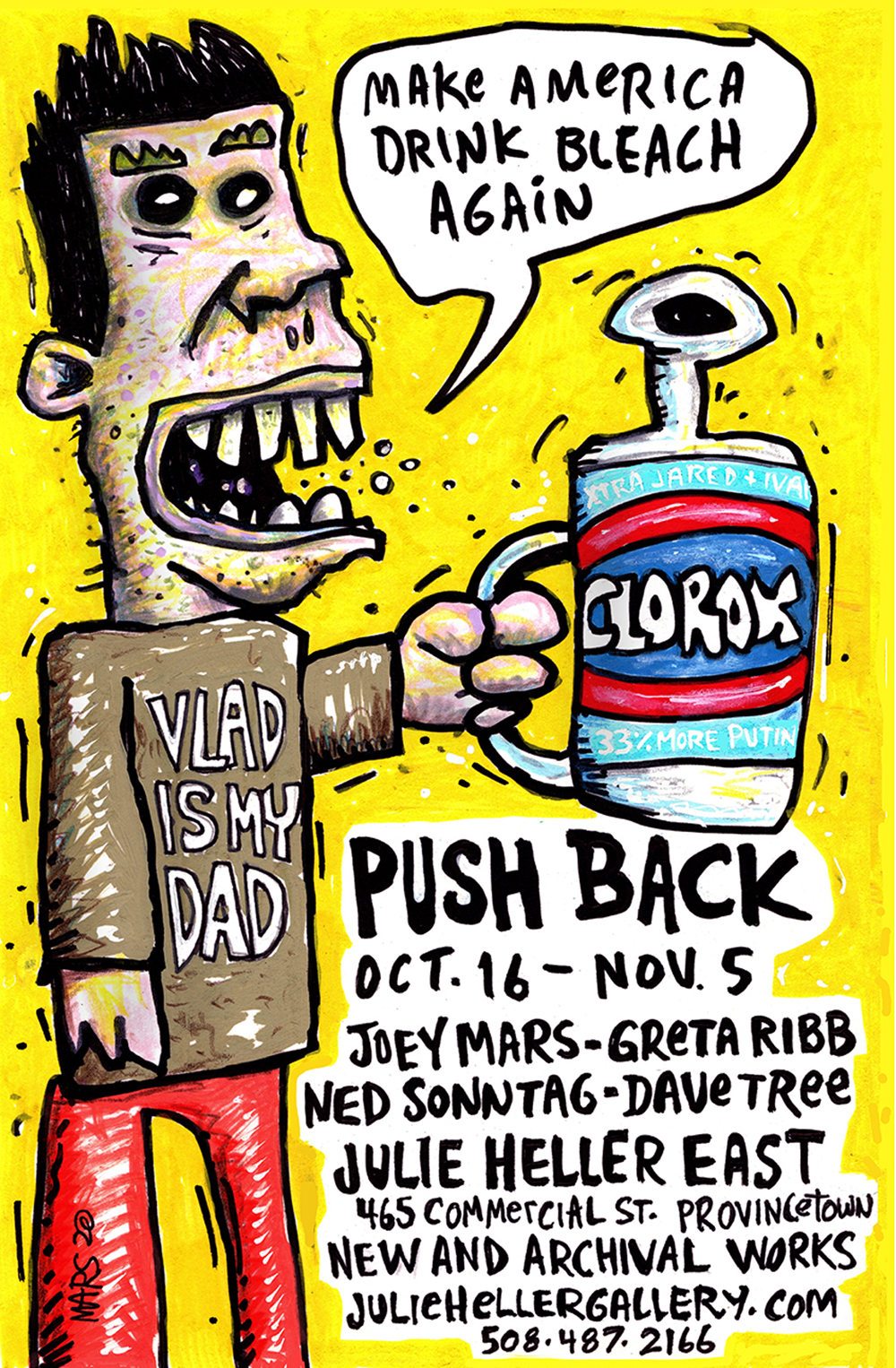
REVIEW: Push Back Exhibition at Julie Heller East
by Steve Desroches
October 21, 2020
Strolling Commercial Street on any given day, the sheer amount of art within your sightline is an amazing gift, perhaps even overwhelming. From gallery windows to the sculptures on the lawn of the Provincetown Art Association and Museum to even a bit of guerrilla street art here and there. But there, smack in the middle of town, is perhaps the largest singular work of art in Provincetown. It’s hard to miss at 33 feet wide, and each time you look at it you notice a new element. It’s also perhaps the best representation of Provincetown’s counter culture history and rebellious spirit. It’s Shop Therapy’s façade covered by the enormous mural done by artist Joey Mars.
For over 30 years Mars has been a fused fixture of art, counter culture politics, and rock and roll in New England and beyond. And the new group show Push Back, of which he takes the lead, at Julie Heller East Gallery is a high-voltage exploration of the current political crisis in the United States, as well as a satisfying smackdown of the fascist flirtations of the Trump administration. Featuring the work of Mars and Greta Ribb, Ned Sonntag, and Dave Tree, Push Back is as explosive as it is vibrant in its artistry and politics. On the exterior wall of the Julie Heller East Gallery is a large cut out image of Donald Trump’s face the size of the disembodied floating head in The Wizard of Oz with a dollar sign under his nose giving him a Hitler’s mustache. That work is an apt greeting for the exhibition inside.
Once inside, a signature piece by Mars in the main view of the gallery’s window, says “Make America Take Acid Again”, a playful nod to the counterculture of the Sixties, from which the art inside evolved, as well as a somewhat literal invitation to take in the show as a grouping, and then focusing on piece by piece. Strange days call for art as much as any other. Push Back is both an interpretation and a call to arms reflecting the times by blurring the disturbing, such as the frequent use of Nazi imagery with the playfully confusing use of color, pop culture, and disciplined execution of each selected medium. The show in its totality is akin to flipping television channels rapidly, or taking a ride on Willy Wonka’s boat through the magical tunnel in which Violet Beauregarde exclaims, “What is this a freakout?!” Yes, Violet, it is.
Push Back featuring the work of Joey Mars, Greta Ribb, Ned Sonntag, and Dave Tree is on exhibition at Julie Heller East, 465 Commercial St., Provincetown, through November 5. For more information call 508.487.2166 or visit juliehellergallery.com

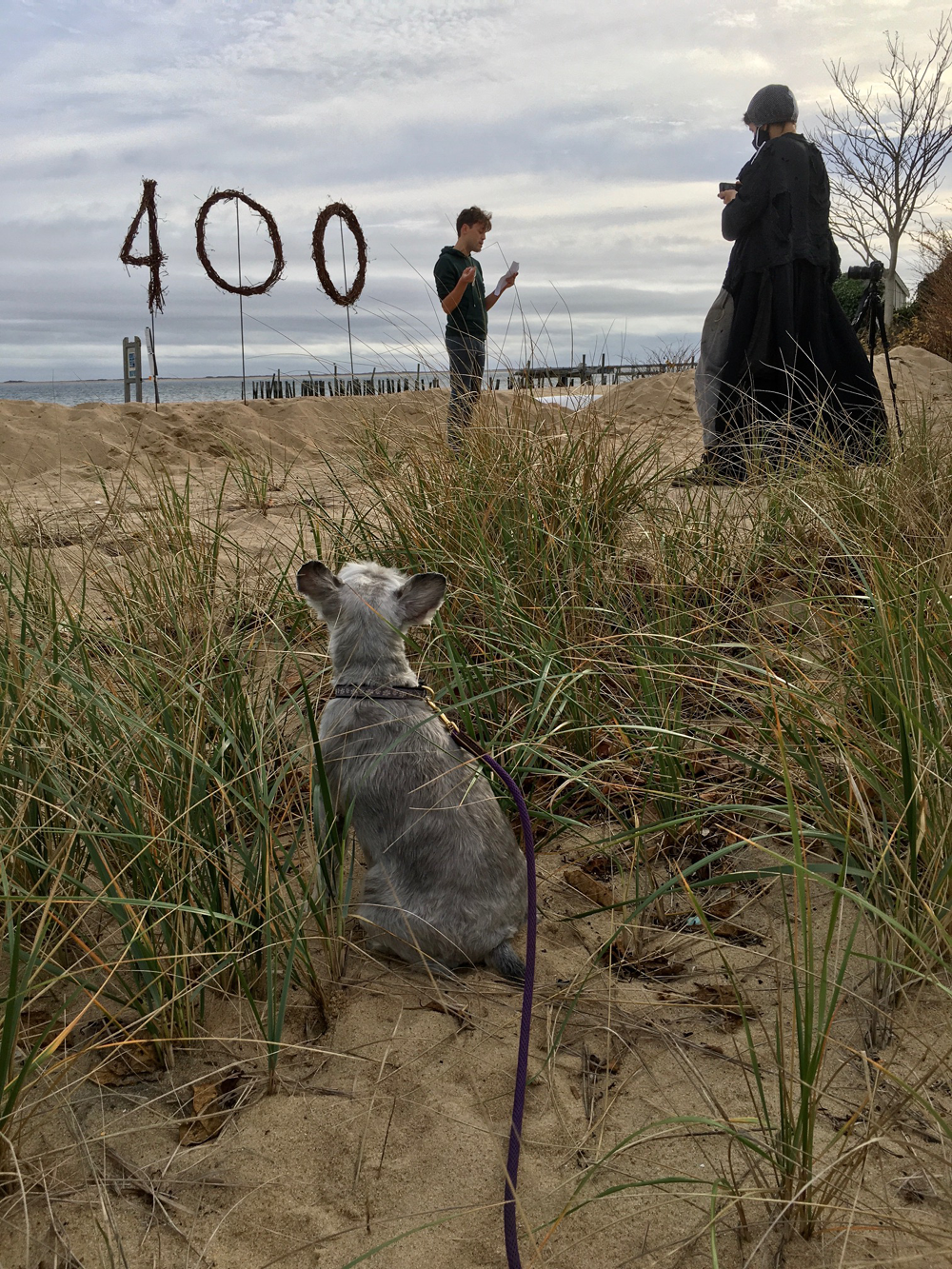
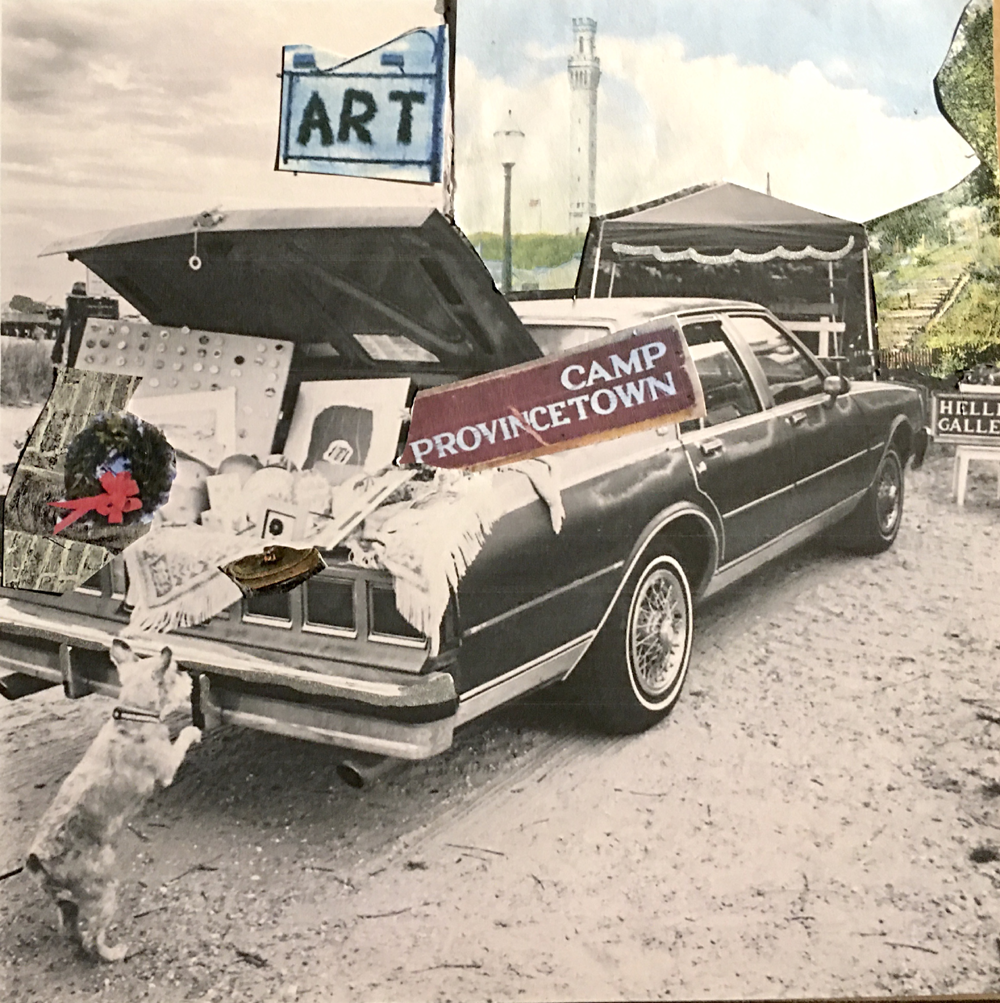
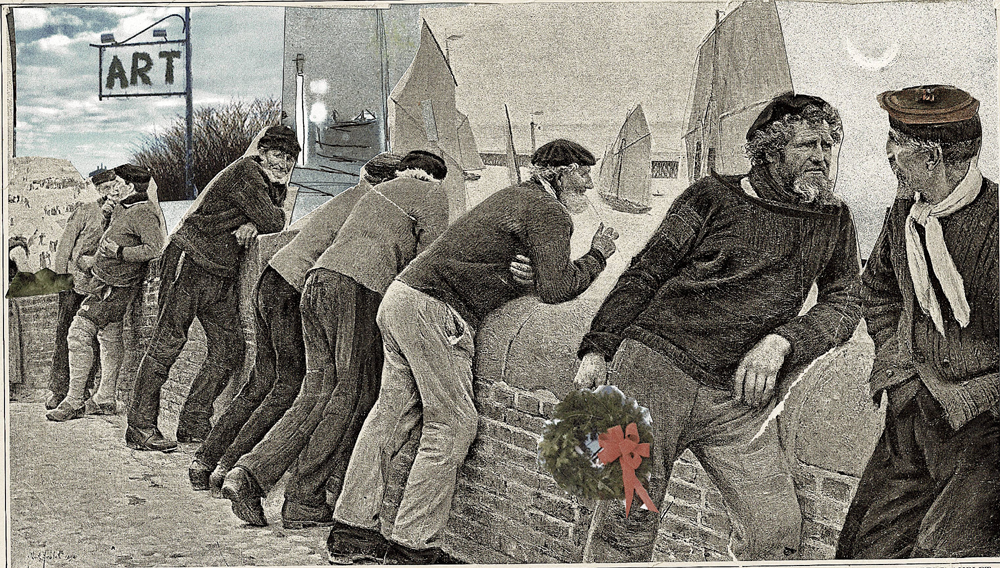
Special thanks and credit for without you we would only be half the men we used to be.
Julie Heller, David Bieber, Karen Cappotto, Greta Ribb, James Ryan, Jeanne Smith, Jude Ahern, Joey Mars, Saltine, Anne Hutchenson, Pasquale Natale, Cedar and Lisa Gluck, Christina Bird, Jay Critchley, Sarah Kain, Michael Koehler, Christopher Wilcox, Rod Webber, Samuel Tager, Lauren Pespisa, Dave Tree, Marcia Mello, Siobhan (one name like Cher or Sting), David Columbo, Springa (one name like Siobhan or Bono), Lance Salemo, Adam and the Alley People (good name for a band!), Steve Desroches, Sam Smiley, John Greiner-Ferris, and The Mamas and Papas. And to everyone who should have been thanked before any of these people therefore mentioned, we love you all!
